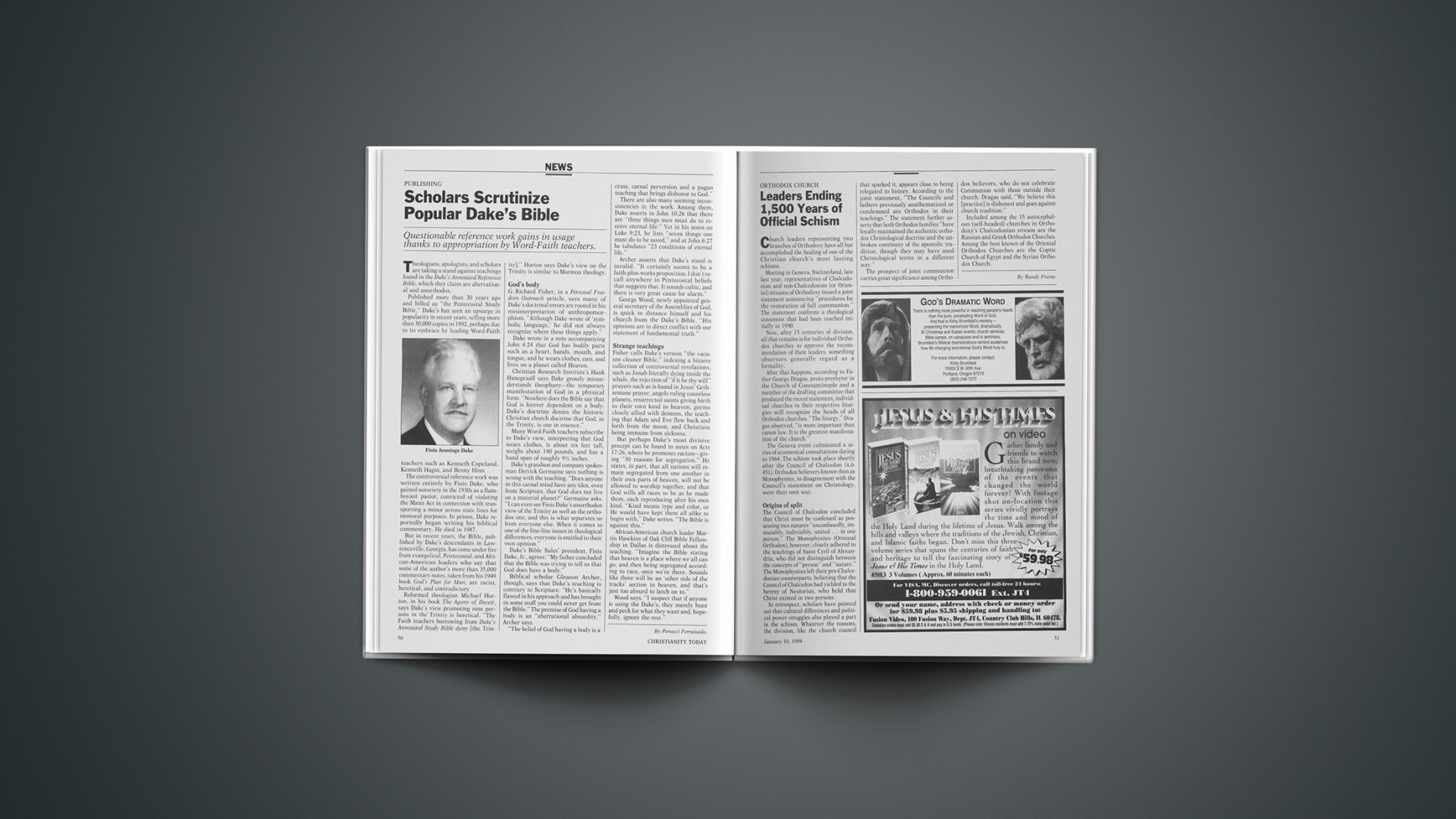Questionable reference work gains in usage thanks to appropriation by Word-Faith teachers.
Theologians, apologists, and scholars are taking a stand against teachings found in the Dake’s Annotated Reference Bible, which they claim are aberrational and unorthodox.
Published more than 30 years ago and billed as “the Pentecostal Study Bible,” Dake’s has seen an upsurge in popularity in recent years, selling more than 30,000 copies in 1992, perhaps due to its embrace by leading Word-Faith teachers such as Kenneth Copeland, Kenneth Hagin, and Benny Hinn.
The controversial reference work was written entirely by Finis Dake, who gained notoriety in the 1930s as a flamboyant pastor, convicted of violating the Mann Act in connection with transporting a minor across state lines for immoral purposes. In prison, Dake reportedly began writing his biblical commentary. He died in 1987.
But in recent years, the Bible, published by Dake’s descendants in Lawrenceville, Georgia, has come under fire from evangelical, Pentecostal, and African-American leaders who say that some of the author’s more than 35,000 commentary notes, taken from his 1949 book God’s Plan for Man, are racist, heretical, and contradictory.
Reformed theologian Michael Horton, in his book The Agony of Deceit, says Dake’s view promoting nine persons in the Trinity is heretical. “The Faith teachers borrowing from Dake’s Annotated Study Bible deny [the Trinity].” Horton says Dake’s view on the Trinity is similar to Mormon theology.
God’s body
G. Richard Fisher, in a Personal Freedom Outreach article, says many of Dake’s doctrinal errors are rooted in his misinterpretation of anthropomorphism. “Although Dake wrote of ‘symbolic language,’ he did not always recognize where these things apply.”
Dake wrote in a note accompanying John 4:24 that God has bodily parts such as a heart, hands, mouth, and tongue, and he wears clothes, eats, and lives on a planet called Heaven.
Christian Research Institute’s Hank Hanegraaff says Dake grossly misunderstands theophany—the temporary manifestation of God in a physical form. “Nowhere does the Bible say that God is forever dependent on a body. Dake’s doctrine denies the historic Christian church doctrine that God, in the Trinity, is one in essence.”
Many Word-Faith teachers subscribe to Dake’s view, interpreting that God wears clothes, is about six feet tall, weighs about 190 pounds, and has a hand span of roughly 9½ inches.
Dake’s grandson and company spokesman Derrick Germaine says nothing is wrong with the teaching. “Does anyone in this carnal mind have any idea, even from Scripture, that God does not live on a material planet?” Germaine asks. “I can even see Finis Dake’s unorthodox view of the Trinity as well as the orthodox one, and this is what separates us from everyone else. When it comes to one of the fine-line issues in theological differences, everyone is entitled to their own opinion.”
Dake’s Bible Sales’ president, Finis Dake, Jr., agrees: “My father concluded that the Bible was trying to tell us that God does have a body.”
Biblical scholar Gleason Archer, though, says that Dake’s teaching is contrary to Scripture. “He’s basically flawed in his approach and has brought in some stuff you could never get from the Bible.” The premise of God having a body is an “aberrational absurdity,” Archer says.
“The belief of God having a body is a crass, carnal perversion and a pagan teaching that brings dishonor to God.”
There are also many seeming inconsistencies in the work. Among them, Dake asserts in John 10:26 that there are “three things men must do to receive eternal life.” Yet in his notes on Luke 9:23, he lists “seven things one must do to be saved,” and at John 6:27 he tabulates “23 conditions of eternal life.”
Archer asserts that Dake’s stand is invalid. “It certainly seems to be a faith-plus-works proposition. I don’t recall anywhere in Pentecostal beliefs that suggests that. It sounds cultic, and there is very great cause for alarm.”
George Wood, newly appointed general secretary of the Assemblies of God, is quick to distance himself and his church from the Dake’s Bible. “His opinions are in direct conflict with our statement of fundamental truth.”
Strange teachings
Fisher calls Dake’s version “the vacuum cleaner Bible,” indexing a bizarre collection of controversial revelations, such as Jonah literally dying inside the whale, the rejection of “if it be thy will” prayers such as is found in Jesus’ Gethsemane prayer, angels ruling countless planets, resurrected saints giving birth to their own kind in heaven, germs closely allied with demons, the teaching that Adam and Eve flew back and forth from the moon, and Christians being immune from sickness.
But perhaps Dake’s most divisive precept can be found in notes on Acts 17:26, where he promotes racism—giving “30 reasons for segregation.” He states, in part, that all nations will remain segregated from one another in their own parts of heaven, will not be allowed to worship together, and that God wills all races to be as he made them, each reproducing after his own kind. “Kind means type and color, or He would have kept them all alike to begin with,” Dake writes. “The Bible is against this.”
African-American church leader Martin Hawkins of Oak Cliff Bible Fellowship in Dallas is distressed about the teaching. “Imagine the Bible stating that heaven is a place where we all can go, and then being segregated according to race, once we’re there. Sounds like there will be an ‘other side of the tracks’ section in heaven, and that’s just too absurd to latch on to.”
Wood says, “I suspect that if anyone is using the Dake’s, they merely hunt and peck for what they want and, hopefully, ignore the rest.”
By Perucci Ferraiuolo.










